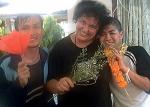A Talk By Shirin Ebadi
Bob has been in the north for the last week so I joined the Foreign Correspondents Club the other day as a way of meeting other English speaking people in Bangkok.
Membership is reciprocal with Foreign Correspondents Clubs around the world; I first discovered the club in Phnom Penh, Cambodia a couple years ago. The club provides journalists with a venue and equipment for media activities but also provides memberships for other expats who live abroad or visit often…my category being “retired.” The club, in the penthouse of the Mayeena Building, sponsors activities like talks by visiting personalities like the Dalai Lama, has a bar and restaurant and a collection of English language papers, books and magazines.
So my first visit was to a talk given by Shirin Ebadi, the Muslim activist who was awarded the Nobel Peace Prize in 2003. The talk was very short…the questions by many of the media seemed designed for making their own statements about other governments like Burma, North Korea, the U.S. and Iraq.
Ms Ebidi is a self declared human rights activist (having once been jailed for her activities) and one of the many attorneys who are working together with many of the nearly 200 journalists who are currently incarcerated in Iran. She said that it is impossible to determine the exact number of people jailed for their human rights work because the statistics are not released by the government and families do not want to tell why their members are in jail for fear of reprisal.
Her most adamant point was that violence and war solves nothing but instead intensifies conflict. She added that Iran is not in a position to pose any danger to any of it’s neighbors. Then she continued by saying that it is left up to various Non-Governmental Organizations in Iran to go into neighboring countries with any messages, eg. human rights workers in Iran “are in agreement with Iraq’s Muslim leader, Sistani, who is adamantly advocating separation of church and state in Iraq.”
In describing her work, Ms Ebidi stressed that “the power of the pen is much stronger than the power of arms…the work of the pen can do more than an entire army,” she said. (Most of the people in attendance clapped in agreement when she commented that now that Saddam Hussein is going to be put on trial, the country must put western governments on trial too for collaborating with Hussein when he gassed the Iranians during the seven-year Iran/Iraq war!)
“So human rights activists are fighting for the freedom of the pen,” she said. “All societies need freedom of expression…the first stepping stone of democracy.” Regarding Burma, she said that the role of mass media is critical and the media should demand that the democratically elected leader and Nobel Prize winner, Aung San Suu Kyi, be given her freedom from house arrest.
When asked for her reaction to the Muslim woman in New York City who led a group of Muslim women in prayer over the objections of male Muslim leaders, she said she was not a religious person so she couldn’t comment on religion…but then went on to say that all women should be able to practice their religion the way they want. Islam, like all other religions, can be interpreted differently but any interpretation must be consistent with today’s societies. “What is the true Islam,” she asked? She answered herself by saying that “we all have a small piece of the truth. We must believe in what we are doing and believe in our path and allow the others to follow their own paths.” But then she added that “many use Islam to impose their political will on others.”
The most interesting question was asked by a woman from the BBC. She wanted to know how Ms. Ebidi was able to be critical of Iran, a country, like Thailand, that considers criticism as unpatriotic, without incurring reprisal. Her answer was that sometimes activists are accused of plotting against national security, but that it is impossible for one person to make a complete change in a country and any change must take place through the people. “The world is a mirror that reflects the good and bad in us eventually,” she concluded.
A man at my table was a professor of engineering at a local university. After introducing myself (retired and a traveler) he wondered why I was interested in “this.” I thought it was an interesting question. I was kind of speechless for a moment since the answer seemed so obvious to me. Then I remembered that my son Doug told me that when they got married his Thai wife, Luk, didn’t know who Prime Minister Thaksin was…an example of the lack of general knowledge of and interest in civic affairs. The other person at my table was a woman who worked in the human resources department of an oil company who was going to be doing business with Iran. The man at the table had a slight Indian accent but side-stepped the where are you from question from the woman. I mentioned that I thought the speaker was very “cagey” in her answers…and the guy was delighted with the use of the word “cagey” but I admitted I had no idea how the word came to be used this way! I love this stuff.
Tags: Bangkok, Conversations, Human Rights, Iran, Language, Middle East, Thailand, World Watching And Politics


Ment to say – PLACE
Just a note from Oregon City – Please is up for sale – have sold the property part. House is still pending – been on market 3 weeks. We are trying to keep track of you, you certainly stay on the move.
Love to you both Cindy